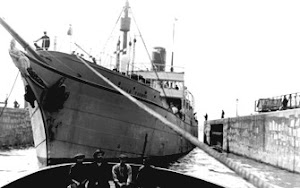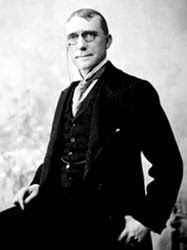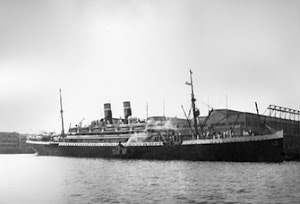Giuseppe Falcone was born 14 January 1879 in the village of Roseto (rose garden) Valfortore in the providence of Foggia [fOd’jA]. Giuseppe is the son of Michelantonio Falcone and Maria Cristina Romano. About 1899, Giuseppe married Maria Lenardo Perna, daughter of Vitangelo and Luise Perna. On 17 May 1902 the couple was blessed with their first child, Mary Pasquale. Looking for a better way to provide for his new family, Giuseppe decided to sail to America and stay long enough to earn money sufficient to buy land in Italy and become a vintner.
From Roseto, his younger brother, Rocco and his two brother-in-laws Antonio and Biagia Perna joined Giuseppe on his trip to America. They boarded the Trojan Prince on 28 December 1902 in Naples. The four Italian men arrived at Ellis Island on 19 January 1903. After entering the United States, the Falcone and Perna men traveled to Wellsburg, West Virginia to meet up with relatives. They found jobs working in the mines. Before much time passed, Giuseppe decided that mining was not for him. He moved to Columbus, Ohio and began working for the largest industrial employer in the United States at the time, the Pennsylvania Railroad. Little did he know this change in jobs would change his life plans.
Giuseppe found work with the Pennsylvania Railroad during the height of the company’s success and popularity. He initially worked in the yard in Columbus. While attending to his duty of changing cars, his left leg was caught in the car switching mechanism. Unfortunately the leg could not be saved and was lost at the hip. This handicap made becoming a vintner impossible. Giuseppe no longer had the ability to walk without the aid of a wooden leg and cane. In response to this accident, the Pennsylvania Railroad offered him $300.00 and a lifetime job as a crossing guard in Greenfield, Indiana. Giuseppe decided to take the lifetime job and sent for his wife and daughter in Italy.
Maria and Mary traveled to Naples and boarded the Princess Irene. After the thirteen-day voyage, Maria and little Mary arrived at Ellis Island on 25 January 1906 with $72.00 on hand.
Giuseppe moved to Greenfield on 22 August 1905. Greenfield is located along the Old National Road (U.S. 40) and P.R.R. main line between Richmond and Indianapolis. The town had many services available to residents. Greenfield was home to multiple schools, grocers, mills and banks. It was also home to Hoosier Poet and Little Orphan Annie author, James Whitcomb Riley. In addition to writing poetry, Riley was an early social justice advocate. The poet wrote many poems inspired by his surroundings in Greenfield such as Ole Swimming Hole and Brandywine. His rise to fame spurred poetry readings and festivals in the area. Giuseppe had a personal relationship with the poet. According to grandson, Bruce, the two had many insightful exchanges over a pail of beer. Giuseppe and Maria raised their family in this small town atmosphere.
The Falcone family grew in Greenfield. The first child to be born in America was Angelo in 1906. Angelo did not survive infancy. The following year Carmelia was born. By the time Carmelia was born, the couple began acquiring property. They eventually owned four homes in Greenfield, one to live in and three to rent out. The lots were kept for gardens, cows and chickens in order for the family to produce most of their own food. The desire to become a vintner never completely left Giuseppe. He and his family had planted grapevines in the garden to make Red Dago, a homemade wine, despite the children’s objections. They wanted to use all those grapes to make jelly. Carmelia’s birth was followed by the births of Michael (1909), John (1911), Vitangelo (1913) and Genevieve (1915).
While World War I raged in Europe, Giuseppe took the Oath of Allegiance on 1 June 1914. His United States citizenship being granted made Maria and Mary automatic U.S. citizens. Giuseppe had been called by Joseph for many years but was now using the shortened form, Joe. Maria continued to go by Lena. Within four years of naturalizing, Giuseppe and the family suffered the loss of Maria.
On 2 March 1918, Maria Lenardo Perna Falcone died in Greenfield, Hancock, Indiana. She died from cerebral hemorrhaging due to acute exhaustion. Her passing left Giuseppe with six children to rear in addition to working as a full-time railroad crossing guard. The family rallied together. Giuseppe made it possible for the children to continue and complete their schooling despite not having a lot of monetary resources. Giuseppe knew he needed a wife and his children needed a mother. He corresponded with Maria Grazia Antonio Di Iorio from Foggia, Italy, the daughter of Pasquale Di Iorio and Giuditta Farace. The two were married on 9 September 1920 in Foggia. After the wedding, Giuseppe brought Maria back to Indiana. Oldest son Michael recalled, “[Maria] took over in great style and fit in perfectly with the family and lifted a great burden from us. She was very pleased and happy with us and we with her.”
Giuseppe and Maria had six children. Anthony Edward was born in 1922. He was followed by Lena Frances (1922), Joseph (1926), Cosmos (1928), Cofino (1929) and Rocco (1930). Giuseppe and Maria were very resourceful. Giuseppe was a typical European patriarch in the traditional family relationship that made the man the sole head of the family, followed by his wife and then children. He worked hard and expected the same from his family. According to son, Vitangelo, Giuseppe always had a project for his young sons to work on either in the garden or building a lean-to “whether it was needed or not.” Giuseppe’s folk wisdom was right on target in describing what it was like to work with boys for “one boy is a boy, two boys is half a boy and three boys is no boy at all.” Many of the work projects, involving more than one son, began with a fight over who did what last. The fighting was usually quelled by what the boys referred to as “the fastest cane in the West.” Giuseppe was known in the family for being able to wield that cane with speed. To survive it, “you had to duck or get clobbered.”
Giuseppe typically worked seven days a week for twelve hours leaving Maria and the children to care for the properties, lots and keep an eye out for the various renters. Coal was an important fuel for all homes as most heating was done with coal. Giuseppe acquired and maintained a coal yard. Daughter Carmelia used to tell her sons humorous stories about the antics of the renters, especially the Yeagers and the Spencers who were poor and would succumb to the temptation to steal coal more than once. Despite these shenanigans, Giuseppe made sure his renters always had sufficient food.
Hardship came upon the Falcone family once again. In the midst of the Great Depression, baby Cofino did not live past his first year. The following year, Cosmos died from bronchial pneumonia. He was three years old. Before the untimely death of son, Cosmos in 1931, the family moved from Greenfield, 53 miles east to Richmond, Indiana. The move to Richmond was the last in a series of moves due to being relocated by the Pennsylvania Railroad. Between 1928 and 1935 the company let go 77,248 employees. Some of the work weeks were cut to three days. But the P.R.R. made good on their word to Giuseppe, however, and he maintained his job. Despite the relocations, there were some things the children could always rely on like having spaghetti every Sunday.
Two years after the move to Richmond, Giuseppe lost his second wife, Maria Grazia Antonio Di Iorio, to myocarditis. Their youngest child, Rocco was only 17 months old and would grow up without a mother in the home.
As Giuseppe’s children grew and married, he made time to visit his grown children and grandchildren. One of his visits to daughter Carrie in Sunnyside resulted in a case of mistaken identity. The homes in this East Chicago suburb looked very similar and “Pop,” as he was affectionately called by his children, went to the wrong house. Mrs. Sullivan answered the door and mistook the five foot two inch Italian man, with a thick accent and cane, for a beggar. She told him to go to the back door and she would bring him food. He took some offense to the gesture and responded, “Look lady, I buy and sell you three times!” Even though he was a very proud man, he was also able to have fun at his own expense. Grandson, Bruce Lax recalls grandpa Falcone’s visits to his home in Sunnyside.
As a young boy, Bruce used to pinch Giuseppe’s wooden leg and Giuseppe would playfully yell “ouch.” Perhaps it was this disposition that earned him the nickname, “Old Man Sunshine.” As Giuseppe grew older he increasingly suffered the effects of diabetes. Daughter Carrie recalled a visit to her home for dinner one evening. Giuseppe had begged Carrie for something to eat before dinner was ready. She refused him telling him dinner would be ready shortly. It wasn’t until years later when Carrie suffered from diabetes that she understood why it was hard for her father to wait for supper.
Giuseppe Falcone died on 13 October 1942. He was 63 years old. He was buried in Richmond, Wayne, Indiana. He survived the loss of a leg, the passing of both of his wives and the childhood deaths of three of his sons. He successfully kept his family together, maintaining closeness with his children. The young man who started from a place called rose garden was laid to rest in the town known as Rose City.
Tuesday, December 4, 2007
Subscribe to:
Comments (Atom)




